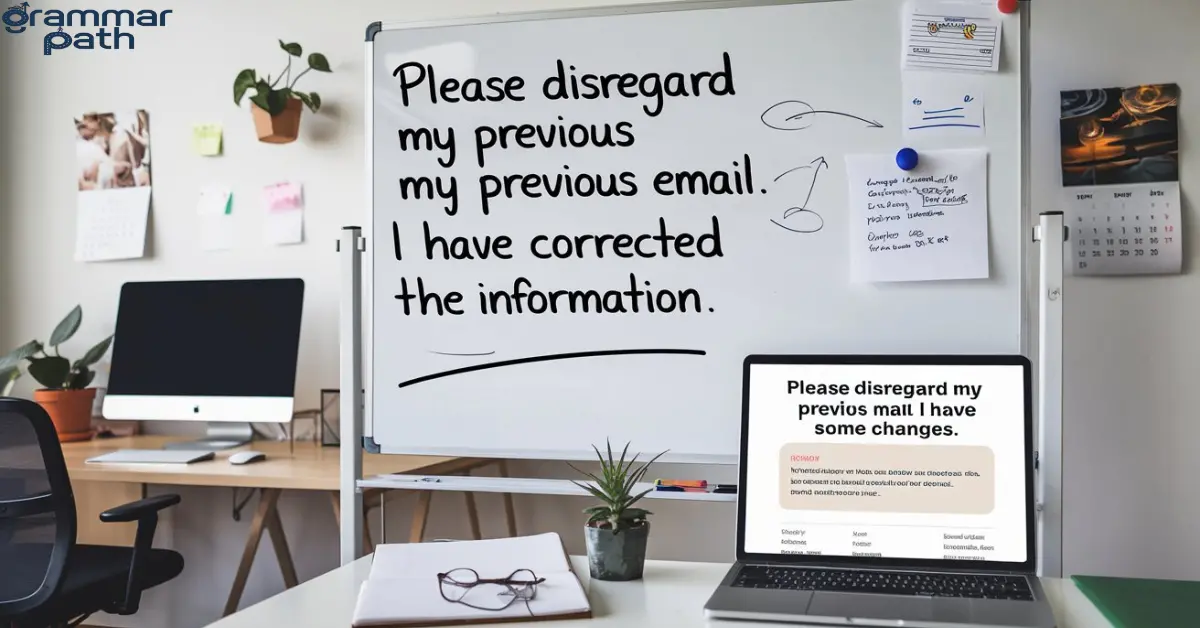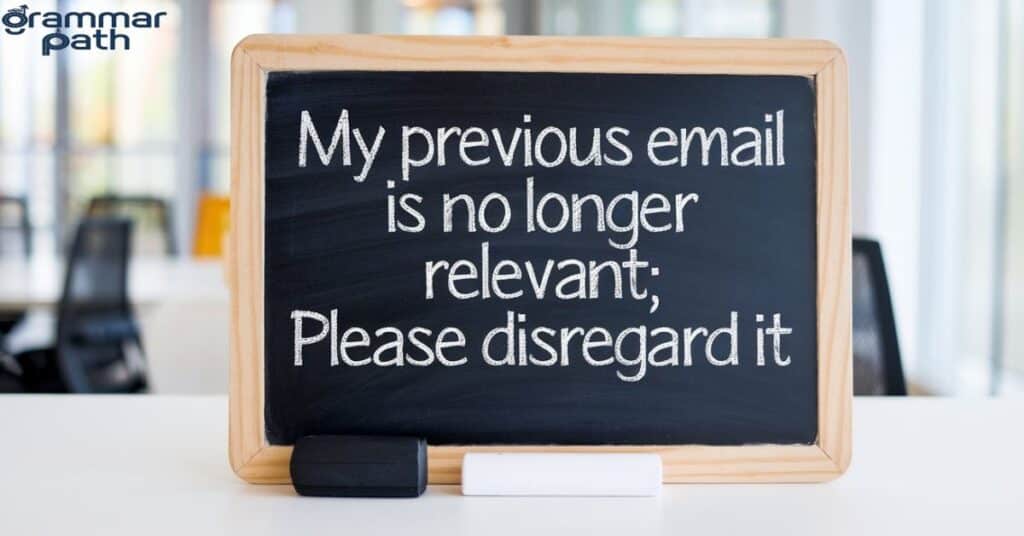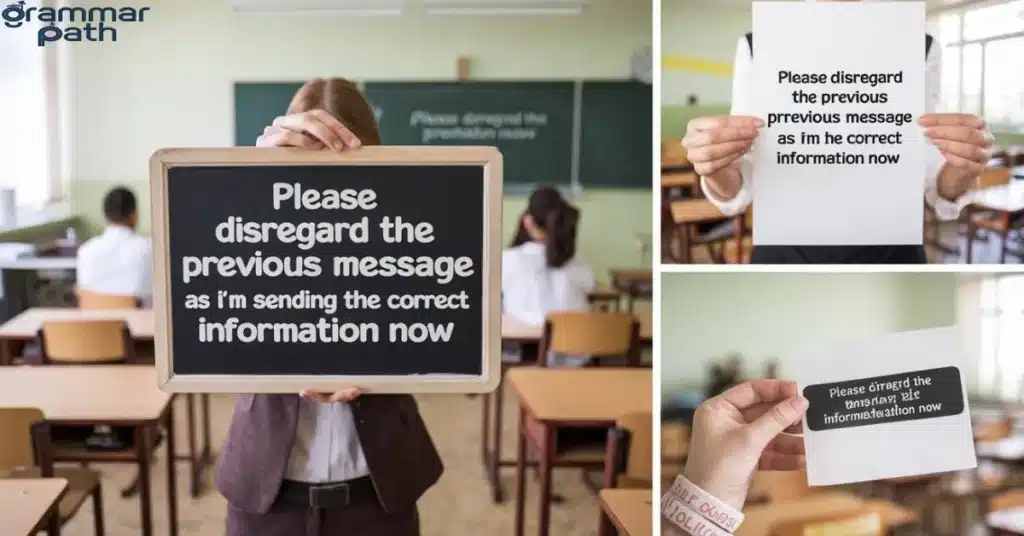
20 Other Ways to Say “Please Disregard My Previous Email” (With Examples)
Mistakes happen, especially in the fast-paced world of digital communication. Whether it’s an email sent prematurely or containing incorrect information, knowing how to gracefully correct an email mistake is key to maintaining professionalism. If you ever find yourself in this situation, you might be wondering, “What’s a polite way to say ‘please disregard my previous email’?” Fortunately, there are multiple ways to express this sentiment while maintaining respect and clarity.
In this guide, we’ll explore 20 other ways to say ‘Please disregard my previous email,’ each with real-world examples to help you manage these moments with ease.
is it Professional to Say: “Please Disregard My Previous Email”
Saying “Please disregard my previous email” is generally considered professional, as it directly and politely addresses the need to correct a mistake.
However, it can be enhanced by adding context or offering an apology to demonstrate accountability. A more polished approach, such as “My apologies, please disregard my earlier email,” shows both professionalism and respect for the recipient’s time, ensuring clear communication without sounding abrupt.
What To Say Instead of “Please Disregard My Previous Email”
- Kindly ignore my last message
- Please consider my previous email null and void
- My apologies, but you can disregard my last email
- Please overlook my previous communication
- Ignore my earlier email, please
- My previous email is no longer relevant; please disregard it
- Please disregard my last message and accept my apologies for any confusion
- I retract my previous email; please disregard it
- Forget about my last email, please
- Please disregard my earlier message and accept my apologies for the oversight
1. Kindly Ignore My Last Message
If you need to inform someone that your last communication is no longer relevant, a simple phrase like, “Kindly ignore my last message,” works well. It strikes a balance between being professional and polite.
Example (Email):
Subject: Correction Regarding Our Previous Discussion
Dear Sarah,
I hope this message finds you well. I wanted to let you know that the details in my earlier email are no longer accurate. Kindly ignore my last message regarding the project timeline. I will send you the updated information shortly.
Best regards,
John

2. Please Consider My Previous Email Null and Void
For a more formal tone, you might say, “Please consider my previous email null and void.” This phrase is direct and clear, signaling the recipient that the earlier email is invalid.
Example (Email):
Subject: Update on Our Marketing Plan
Hi Alex,
After reviewing our recent conversation, I’ve realized the initial information shared was incorrect. Please consider my previous email null and void, as I will be sending an updated version shortly.
Thank you for your understanding,
Emily
3. My Apologies, But You Can Disregard My Last Email
When it’s important to acknowledge a mistake with an apology, this phrase works perfectly. “My apologies, but you can disregard my last email” adds a layer of sincerity to your communication.
Example (Email):
Subject: Correction Regarding Client Feedback
Dear David,
My apologies, but you can disregard my last email about the client feedback. I noticed some inaccuracies in the details shared, and I’ll send you the correct report in a few minutes.
Warm regards,
Jessica
4. Please Overlook My Previous Communication
When aiming for a more formal tone, “Please overlook my previous communication” is a polite way to ask for forgiveness for the mistake made.
Example (Email):
Subject: Project Update Revision
Dear Ms. Thompson,
I hope this email reaches you well. There was an error in my earlier email regarding the new project deadline. Please overlook my previous communication, and refer to the revised information that I’ll send shortly.
Kind regards,
Mark
5. Ignore My Earlier Email, Please
Sometimes, keeping it short and to the point is all you need. “Ignore my earlier email, please” conveys exactly what’s needed in a brief, professional manner.
Example (Email):
Subject: Follow-Up on Meeting Schedule
Hey Charlie,
I realized there was some confusion in my earlier message. Could you ignore my earlier email, please? The correct meeting time is 3 PM on Thursday.
Thanks a bunch,
Anna
6. My Previous Email Is No Longer Relevant; Please Disregard It
When an earlier email has become obsolete, saying, “My previous email is no longer relevant; please disregard it” is both professional and clear.
Example (Email):
Subject: Sales Forecast Adjustment
Hi Oliver,
My previous email is no longer relevant; please disregard it. I made an error in the sales forecast figures, and I will send over the corrected numbers soon.
Thanks for your understanding,
Clara

7. Please Disregard My Last Message and Accept My Apologies for Any Confusion
If your mistake may have caused confusion, this phrasing helps you not only correct the error but also smooth things over. “Please disregard my last message and accept my apologies for any confusion” is an elegant way to handle the situation.
Example (Email):
Subject: Follow-Up on Product Availability
Dear Mr. Adams,
Please disregard my last message and accept my apologies for any confusion it may have caused. I had mistakenly sent the wrong product availability update. I’ll send the correct information shortly.
Best regards,
Lucas
8. I Retract My Previous Email; Please Disregard It
When you need to retract an earlier statement, “I retract my previous email; please disregard it” works well in a more formal setting.
Example (Email):
Subject: Invoice Correction
Dear Laura,
After reviewing the invoice details, I found an error in my earlier communication. I retract my previous email; please disregard it, and I’ll provide you with an accurate version soon.
Best,
Tom
9. Forget About My Last Email, Please
For a casual or informal context, you could say, “Forget about my last email, please.” This keeps the tone light while still correcting the error.
Example (Email):
Subject: Meeting Room Change
Hey Emma,
Can you forget about my last email, please? I just realized I booked the wrong meeting room. I’ll send an updated invite with the correct location.
Thanks,
Max
10. Please Ignore My Earlier Message and Accept My Apologies for the Oversight
This phrase combines both a polite request and a professional apology. Saying, “Please ignore my earlier message and accept my apologies for the oversight” shows accountability and respect.
Example (Email):
Subject: Updated Budget Proposal
Hi Rachel,
I made a mistake in the numbers provided in my last email. Please ignore my earlier message and accept my apologies for the oversight. I’ll send the corrected budget proposal shortly.
Thank you for your patience,
Natalie
Pro Tips:
When writing these kinds of emails, the most important thing is to acknowledge the mistake and provide a solution. Whether you’re retracting an email or apologizing for confusion, it’s essential to maintain professionalism while being direct. Highlight your willingness to correct the error and always include an action plan or next steps so the recipient knows what to expect. Remember, politeness goes a long way in ensuring that the situation remains cordial.
11. Please Ignore the Previous Email and Refer to This One Instead
A straightforward way to ask someone to ignore your earlier message is by adding a clear direction on what they should do next. “Please ignore the previous email and refer to this one instead” gets the point across without confusion.
Example (Email):
Subject: Updated Specifications for the Contract
Hi Adam,
There was an error in the contract specifications I sent earlier. Please ignore the previous email and refer to this one instead. The attached document contains the correct details.
Thanks for your understanding,
Lily
12. Disregard My Earlier Email and Follow the Attached Correction
If you’re sending a corrected document, you can be clear about your mistake and provide the proper file with a message like, “Disregard my earlier email and follow the attached correction.“
Example (Email):
Subject: Revised Budget Breakdown
Dear Sam,
I realized I had included some wrong figures in my initial breakdown. Disregard my earlier email and follow the attached correction. Apologies for the confusion, and feel free to reach out if you have any questions.
Best,
Sophia

13. My Last Email Was Sent in Error, Please Disregard It
Sometimes, emails are sent prematurely. A simple message like, “My last email was sent in error, please disregard it,” ensures that your recipient knows not to take any action based on the incorrect email.
Example (Email):
Subject: Clarification on Upcoming Events
Hi Jason,
My last email was sent in error, please disregard it. I’ll send an accurate list of the upcoming events later today.
Thanks for your patience,
Alyssa
14. Please Disregard My Previous Email as It Contains Incorrect Information
This option is perfect when you need to clarify that an earlier message contained incorrect or outdated details. “Please disregard my previous email as it contains incorrect information” sets the right tone.
Example (Email):
Subject: Error in Marketing Report
Dear Michelle,
I just realized that there are some inaccuracies in the report I sent earlier. Please disregard my previous email as it contains incorrect information. I will resend the correct version soon.
Sincerely,
Michael
15. The Information in My Earlier Email Is Incorrect; Please Ignore It
If you’re correcting factual errors, being specific helps. “The information in my earlier email is incorrect; please ignore it” is a polite way to address the mistake.
Example (Email):
Subject: Update on Sales Figures
Hi Tom,
Unfortunately, I made a mistake in the sales figures I sent earlier. The information in my earlier email is incorrect; please ignore it. I’ll provide an updated report this afternoon.
Regards,
Grace
16. Apologies for the Confusion, but My Last Email Is Outdated
If the issue is outdated information, you can say something like, “Apologies for the confusion, but my last email is outdated.“
Example (Email):
Subject: Updated Meeting Schedule
Hi Rebecca,
Apologies for the confusion, but my last email is outdated. Please use the updated meeting schedule in this message.
Thanks for understanding,
James
17. Please Overlook My Earlier Email; It Was Sent Prematurely
For emails sent too soon, “Please overlook my earlier email; it was sent prematurely” works well to inform the recipient of the error.
Example (Email):
Subject: Revised Travel Itinerary
Hi Chris,
Please overlook my earlier email; it was sent prematurely. I’ve attached the correct travel itinerary for our upcoming trip.
Best regards,
Emily

18. Please Ignore My Last Email; It Contains Incorrect Dates
When correcting a specific error like dates or times, it’s helpful to specify what went wrong. “Please ignore my last email; it contains incorrect dates” addresses this issue directly.
Example (Email):
Subject: Change in Event Dates
Hey Brian,
It seems I sent the wrong dates in my last message. Please ignore my last email; it contains incorrect dates. The event will take place on the 15th, not the 10th.
Thanks,
Olivia
19. Forget About the Previous Email; The Information Has Changed
If the situation or details have evolved, you can explain it with, “Forget about the previous email; the information has changed.“
Example (Email):
Subject: Adjustments to Project Timeline
Dear Angela,
Upon reviewing our progress, I realized we need to adjust the timeline. Forget about the previous email; the information has changed. I’ll send the revised schedule shortly.
Best,
Ethan
20. Please Disregard the Previous Message as I’m Sending the Correct Information Now
If you’re in the process of sending the correct information, this phrase works: “Please disregard the previous message as I’m sending the correct information now.“
Example (Email):
Subject: Revised Contract Details
Hi Victoria,
Please disregard the previous message as I’m sending the correct information now. Attached is the correct version of the contract with the updated terms.
Thank you for your patience,
Nathan

Pro Tips:
When correcting an email, timing is key. Respond as quickly as possible once you’ve realized the mistake to avoid confusion or actions being taken based on incorrect information. Be direct and polite, acknowledging the error and offering a clear solution—whether that’s a corrected document or updated information. Maintaining professionalism even in small errors shows accountability and helps to preserve your working relationships. Using phrases like “my apologies” and “thanks for understanding” can also help keep the tone respectful and cordial.
Conclusion
Mistakes in emails are inevitable, but how you handle them can make all the difference. Offering a clear, polite way to say “Please disregard my previous email” ensures that you maintain professionalism while correcting any misunderstandings. Whether you’re dealing with incorrect information, outdated details, or a prematurely sent message, using one of these alternative phrases can smooth over the situation and keep communication flowing efficiently.
By promptly acknowledging your error, providing the correct information, and using the right tone, you demonstrate both accountability and respect for your recipient’s time. Remember, everyone makes mistakes, but with these helpful variations, you can fix yours while keeping your professionalism intact.

Emily Olivia is an experienced writer specializing in grammar and English language topics. With a passion for clarity and precision, she shares valuable insights on synonyms, grammar rules, and writing tips to help readers enhance their language skills on Grammar Path.





